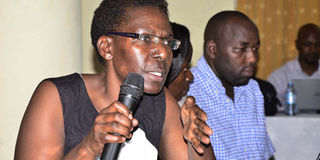Local manufacturers ask govt to explain role of foreign investors

Ms Jane Nalunga, the country director, Seatini Uganda, addresses the media in Kampala on Monday. PHOTO BY ALEX ESAGALA
What you need to know:
Improper. Speakers wondered why government allows foreign investors to venture into small businesses that can be managed by nationals
Kampala.
Tempers were high at the Monday validation meeting for the draft report on Uganda-Netherlands bilateral investment treaty in Kampala as local manufacturers tasked Uganda Investment Authority (UIA) to explain what foreign investors have contributed to the country’s economy.
In response, Mr Charles Omusana, the UIA investment facilitation and aftercare officer, who in his overview of Uganda’s investment climate, said foreign investors still offer opportunities in ICT, tourism and agro-processing.
“There is a big opportunity for investment sectors like tourism, ICT and agro-processing. We, therefore, still need many foreign investors. We currently have more than 6000 foreign investors,” Mr Omusana said.
Mr Owomusa’s call for more foreign investors did not go down well with Mr Godfrey Ssali, a development policy analyst and lobbyist at Uganda Manufacturers Association (UMA).
“I am very disappointed that you can stand here and start lecturing to us on investment opportunities for foreigners instead of explaining what they have added on the country’s economy. The economy is struggling, unemployment is very high, and what do foreign investors do?” Mr Ssali said.
A study by the Education ministry shows more than 400,000 graduates are channelled out every year. In August Finance minister, Mr Matia Kasaija, said of these, government employees only 300,000 graduates.
Mr Ssali’s disappointment was shared by Ms Jane Nalunga, the country director Southern and Eastern Africa Trade Information and Negotiations Institute (Seatini).
Ms Nalunga wondered why government has allowed foreign investors to venture into business that can be managed by nationals.
“I know of a German national who is growing coffee. I wonder why such a person could be allowed to grow coffee which can be produced by local farmers,” she wondered.
In response, Mr Omusana said some foreign investors grow their own crops because local farmers have failed to produce what industries need. He also asked the members not to throw blame on UIA yet the authority is just an implementer of decisions made by the Trade and Finance ministries.
Citing an example of Ethiopia that has reserved some sectors such as banking, telecommunication and retail businesses for its nationals, Mr Kenneth Lubogo, the Bulamogi constituency Member of Parliament, also chairman parliamentary trade and industries committee, said it was time some sectors be preserved for only Ugandans.
“Almost every sector of the economy has been taken over by foreign investors whose impact is not seen. The capacity of the locals does not match those of foreigners,” he said, adding: “All local banks like Greenland and cooperative band were closed because they could not match foreign banks,” Mr Lubogo said.
He said he would convince other MPs to have investment policies revised purposely to protect some commercial opportunities for locals. The participants also castigated UIA, Finance and Trade ministries over allowing foreign investors to be guided by employees of State House.
“Some foreign investors are received by State House. State House now becomes a transaction centre. We wonder what roles UIA, Trade and Finance ministries play,” Mr Lubogo said.




